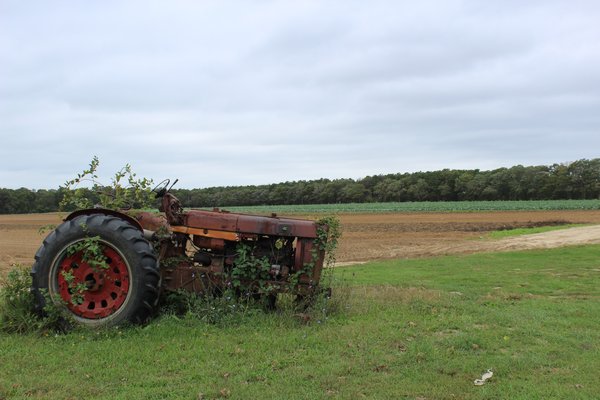
East Hampton’s tiny farming community is trying to craft a set of rules that could help it take advantage of the town’s robust Community Preservation Fund to preserve its farming tradition the way Southampton Town has.
Like Southampton, East Hampton farmers have asked their Town Board to consider legislation that would create a package of “rights” on privately owned land that could be purchased. The new rights would encumber the future use of targeted farmland—beyond just removing the rights to build houses on it—to guarantee that particular active agricultural uses will remain on that property in perpetuity.
Unlike in Southampton, however, the East Hampton farmers who are pressing the idea are not encouraging the town to exclude horse farms, landscaping nurseries or sod growing from the list of uses on farmland, allowing only the production of food crops.
The town’s Agricultural Advisory Committee, which is anchored by a small but young generation of farmers who have established themselves in East Hampton’s three remaining farmland regions, has proposed a collection of easements that would demand the land be in active agricultural production—which courts have said includes being used as horse farms or polo clubs—that it may only be sold to a “bona-fide” farmer, and that it cannot be sold for more than the appraised value of the land at the time the easements were created, adjusted for inflation.
“This would prevent the giant lawn, or the large field with two horses standing in it—we want land used for agricultural purposes,” said Alex Balsam, the head of the town agricultural committee and co-owner of Balsam Farms, an organic produce grower and farm stand on Town Lane in Amagansett. “At the same time, it’s hard for us to sit here in 2016 and say we are going to restrict what a farmer can do with his land 50 years from now, or 200 years from now, when we don’t know what the impacts are going to be from climate change, or the economy, or just what people want. Every parcel of land is going to be different—we want them to be able to do with their land what they think they need to do to make money.”
The easements the East Hampton agricultural committee has proposed would require that land be actively “farmed” at all times. If it is deemed as inactive for more than two years, by the Agricultural Advisory Committee, the rights purchased by the town would allow the town to lease the land to an agricultural user who would keep it working.
For the 17 years of the CPF, the two towns have spent over $500 million on preserving more than 4,000 acres of open space and farmland across the South Fork. But much of that farmland has since vanished from public view behind towering horse barns or behind tall hedges as wealthy buyers figured out that the costly preservation of the land had removed only the rights to build houses, and that “agriculture” could be skewed by attorneys to mean a broad variety uses. Some land that had been preserved with millions in public dollars was sold again for as much as $200,000 an acre for use as horse barns.
Outraged by the affront to the intentions of preservation, the Peconic Land Trust and Southampton Town began taking a more affirmative approach to defining farming as the production of food crops two years ago. In several purchases over the last two years, the town has purchased a broader collection of legal rights that have expunged the ability to do anything but grow food, bringing the value of the land down to only about $25,000 an acre.
The effort has been celebrated by the farming community as ensuring that farmland will be affordable for new generations of farmers to purchase and start new farms.
Peconic Land Trust President John v.H. Halsey said this week that he is hopeful the East Hampton farmers’ proposal will have a similar effect, even if it doesn’t prohibit some of the uses seen as inappropriate in Southampton.
“It’s an interesting variation on the theme,” Mr. Halsey said. “Far be it for us to say there’s only one way to do anything.”
Town officials have not been sold on the idea yet. At discussions with Town Board members, farmers have been asked why the town would buy the additional rights and not just purchase the land in its entirety and lease it to farmers, as the Peconic Land Trust does with several farmers, including Mr. Balsam and his partner Ian Calder-Piedmonte.
“As a farmer, you don’t want to be at the mercy of the whim of a political board,” Mr. Balsam said of the notion. “You’re not going to make improvements, like build a barn, on land you could lose the lease to in a few years. And if you want a greenhouse, you’d have to get town approval? And having something to pass down to future generations, that’s important to a farmer if you want the next generation to follow in your footsteps.”